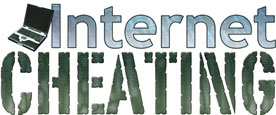University students, administration address issue

University students, administration address issue
Internet-based courses have been at Missouri Southern for five years, and the issue of cheating has surfaced.
One student, who admits to cheating on Internet courses, spoke under the condition of anonymity. The student is currently enrolled in two Internet courses and said she plans to take more.
“Cheating online has become easy to do because there are some professors who never know if their student has been cheating,” she said.
The student gave an example of her cheating. One night she was visiting a friend and decided she didn’t want to take a history quiz. She let her brother do it for her.
“All my brother needed to know was my password,” the student said.
The student said there are some classes where all quizzes and tests are on online.
“I am taking a course and we never have to go on campus for anything,” the student said. “All of the quizzes and tests are online.”
Wade Utter, junior business administration major, said cheating is wrong and he has never taken part in it, but knows students who have.
“I know of students who have been offered material from Internet classes to use, but it has never happened to me,” Utter said.
University President Julio León said faculty members are careful and concerned about Internet cheating.
“We try to minimize cheating as much as possible,” León said. “But we must depend on the integrity and honesty of the students.”
León said the problem with cheating isn’t just on Internet classes but on campus as well.
“Internet cheating isn’t any more of a problem than on campus classes,” he said.
Dr. Cristóbal Sartori, associate professor of Spanish, said when Internet courses began it was for students who couldn’t attend classes on campus, but he believes things have changed.
“With all the cheating going on you would think students would be getting 100 percent,” Sartori said.
Sartori said León pushed the issue for Internet courses so the University could be more competitive with other colleges and universities.
Last semester, Sartori was notified that one of his students had been cheating.
“At this point in time, I am not worried about Internet cheating because I can usually tell if a student is cheating,” he said.
Dr. Larry Cebula, associate professor of history, said Internet courses are a main concern when it comes to academic dishonesty.
“Internet cheating is a big problem on this campus,” Cebula said.
Cebula said he has caught two students cheating and immediately turned them in.
“If we don’t police our Internet classes, Southern will get the reputation of a diploma mill,” Cebula said. “There will be a huge number of students getting credit for work they didn’t do.”
He said if a professor sets up a class so students will get the same tests, they are begging for cheating.
Betty Baker, instructional technologist for Internet-based courses and Blackboard administrator, gives various suggestions to faculty about what to do while teaching Internet courses.
She said there is a code to use to prevent students from printing, duplicating and cut-and-pasting online class quizzes and tests.
Baker also trains instructors who are teaching Blackboard courses.
“Internet courses are a good thing,” she said. “We try to minimize cheating as much as possible.
Cebula has different methods to prevent students from cheating; he gives different test questions from random test banks, students aren’t allowed to print tests or see their correct answers and students are required to come to school to take the final or use a proctor.
Cebula said the University should create an honor code, which will put the students in charge of policing academic dishonesty and monitored testing centers.
“Cheating is awkward,” he said. “We must not look the other way.
Like Cebula and Sartori, there are other instructor’s who have found ways to ensure honesty while taking Internet courses.
David Throop, purchasing director for Missouri Southern, said there is no way of telling if a student is cheating because there is so much information out there.
Throop has also been adjunct faculty for 22 years and has been teaching Internet courses for about five years.
Throop said he tries to ensure honesty by using random questions from a test bank, timing tests and preventing students from printing quizzes.
“The heart of the institution is the instructor,” Throop said.
Throop said he tries to be flexible for students who can’t be in class to take the test. He said a proctor is used on occasions.
Dr. Scott Wells, head of biology department, said he also uses timed quizzes and requires students to come to campus to take a test or use a proctor.
“Point value on quizzes will not allow a student to pass a class,” Wells said.
Wells said online courses are not the best way to take a class, unless it is an inconvenience to take the class on campus.
Cebula and Wells said Internet courses have some disadvantages, but above it all, Internet courses must be monitored to minimize cheating.
“Internet courses are the future of our college,” Cebula said. “It is important that we get it right.”
“The responsibility falls upon the instructor to design the course to prevent Internet cheating,” Wells said.
Your donation will support the student journalists of Missouri Southern State University. Your contribution will allow us to purchase equipment and cover our annual website hosting costs.















